|
|
|
Sort Order |
|
|
|
Items / Page
|
|
|
|
|
|
|
| Srl | Item |
| 1 |
ID:
185192


|
|
|
|
|
| Summary/Abstract |
This article examines how leaders affect the implementation of peace agreements. It argues that implementation is more likely when leaders have publicly committed to peace because public commitments tie leaders’ hands, making it costly to back down from peaceful promises. This effect is hypothesized to hold even under conditions that make implementation costly: when implementing difficult provisions, when spoiler risk is high, and when implementation is unreciprocated. These expectations are tested using novel data from the IPAD dataset on the implementation of peace agreements between 1989 and 2014 and on public statements by state and rebel leaders. Results show that governments and rebel groups whose leaders have publicly committed to peace are significantly more likely to make progress toward implementation. This effect holds for difficult provisions, when spoiler risk is high, and when implementation is unreciprocated. These findings highlight the importance of leaders’ political will for successful implementation of peace agreements and sustainable peace.
|
|
|
|
|
|
|
|
|
|
|
|
|
|
|
|
| 2 |
ID:
142562
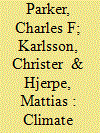

|
|
|
|
|
| Summary/Abstract |
Past research has posited that effective leadership is an essential ingredient in reaching international agreements and overcoming the collective action problems associated with responding to climate change. Despite its fundamental importance for leadership relationships, the demand side of the leadership equation has been comparatively neglected in the literature. In this study, we answer several related questions that are vital for understanding the leadership dynamics that impact the United Nations Framework Convention on Climate Change (UNFCCC) negotiations. Are there any leaders in the field of climate change and, if so, who are they? How do followers select climate leaders? What factors are important to them? Using unique survey data collected at four consecutive United Nations (UN) climate summits, Conference of Parties (COP) 14–17, this article investigates which actors are actually recognized as playing a leadership role in the UNFCCC negotiations and probes how followers select leadership candidates in this issue area. The survey findings reveal a fragmented leadership landscape, with no one clear-cut leader, and spotlight that if an actor seeks to be recognized as a leader, it is crucial to be perceived as being devoted to promoting the common good.
|
|
|
|
|
|
|
|
|
|
|
|
|
|
|
|
| 3 |
ID:
090889


|
|
|
|
|
| Publication |
2009.
|
| Summary/Abstract |
The Commonwealth is short of imaginative leaders after the outstanding generations of Nehru, Trudeau, Nyerere, Lee Kuan Yew, Mandela, and Manley. Yet more than other international bodies it depends on the energy, ideas and personal contact of the people at the top. Democracy is producing a greater turnover of heads of government, but in this hurried world Commonwealth summits are now down to three days and the leaders are not getting enough time to get to know each other face to face in the way that they did in the 1960s, 1970s and 1980s. Between the 2007 summit in Kampala and the 2009 meeting in Port of Spain (27-29 November), 17 new heads of government have taken over. Yet the association is thriving and growing, especially as the work of its civil society organisations grows apace.
|
|
|
|
|
|
|
|
|
|
|
|
|
|
|
|
| 4 |
ID:
082407
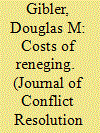

|
|
|
|
|
| Publication |
2008.
|
| Summary/Abstract |
Reputations are supposed to matter. Decision makers consistently refer to reputations for resolve, and international relations theories confirm the value of being able to credibly signal intentions during times of crisis. However, empirical support for the effects of reputation has been lacking. Problems of strategic selection have hampered previous quantitative tests, and the qualitative literature provides scant support for the concept in individual crises. In this article, the author shifts the focus from crisis behavior to alliance commitments and examines the effects that opportunities to uphold previous commitments have on future alliance commitments and conflicts. The results demonstrate that alliance reputations do affect both alliance formation and dispute behavior
|
|
|
|
|
|
|
|
|
|
|
|
|
|
|
|
| 5 |
ID:
138073
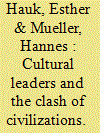

|
|
|
|
|
| Summary/Abstract |
This article builds a microfounded model of cultural conflict. In this model, intrinsically motivated cultural leaders supply and interpret culture. Leaders have an incentive to amplify disagreement about cultural values. This leads to a clash of perspectives between cultures. The population benefits from the supply of culture but suffers if leaders amplify the clash of perspectives. The article discusses constraints to leader behavior and analyzes how economic factors affect the incentives of cultural leaders. Economic strength can lead to displays of cultural arrogance while economic integration between groups can hinder cultural alienation.
|
|
|
|
|
|
|
|
|
|
|
|
|
|
|
|
| 6 |
ID:
188386
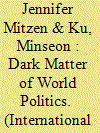

|
|
|
|
|
| Summary/Abstract |
International relations theory has had a trust revival, with scholars focusing on how trust can enhance interpersonal cooperation attempts between leaders. We propose there is another type of trust at play in world politics. International system trust is a feeling of confidence in the international social order, which is indexed especially by trust in its central unit, state persons. System trust anchors ontological security, and its presence is an unstated assumption of the international relations trust scholarship. In this paper we conceptualize system trust. We illuminate its presence by flagging the production of state personhood in a familiar case in international relations trust scholarship, the 1985 Geneva Summit between Reagan and Gorbachev. Interpersonal and system trust perspectives highlight different aspects of the same summit. The juxtaposition suggests new lines of research into the production of state persons in diplomacy, the relationship between interpersonal and system trust, and the impact of the rise of personalistic/patrimonial leadership on diplomacy and international order.
|
|
|
|
|
|
|
|
|
|
|
|
|
|
|
|
| 7 |
ID:
073548
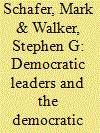

|
|
|
|
|
| Publication |
2006.
|
| Summary/Abstract |
Do the beliefs of leaders make a significant difference in determining if democracies are peaceful and explaining why democracies (almost) never fight one another? Our comparisons of Prime Minister Tony Blair and President Bill Clinton reveal that both leaders view democracies as more friendly than nondemocracies, and they have significantly less cooperative beliefs toward the latter than toward the former, a difference that extends to the behavior of their respective governments during the Kosovo conflict. We also find that individual differences in the operational codes of the two leaders matter in the management of conflict with nondemocracies; the leaders exhibit opposite leadership styles and behavior associated with the domestic political culture of the two states. Overall, these results support the dyadic version of the democratic peace and suggest that the conflict behavior of democratic states depends upon the beliefs and calculations of their leaders in dealing with nondemocracies.
|
|
|
|
|
|
|
|
|
|
|
|
|
|
|
|
| 8 |
ID:
032537
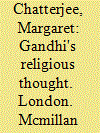

|
|
|
|
|
| Publication |
London, Mcmillan Press, 1983.
|
| Description |
xiv,194p.
|
| Series |
Library of Philosophy and Religion
|
| Standard Number |
0333285964
|
|
|
|
|
|
|
|
|
|
|
|
Copies: C:1/I:0,R:0,Q:0
Circulation
| Accession# | Call# | Current Location | Status | Policy | Location |
| 027511 | 294.564/CHA 027511 | Main | On Shelf | General | |
|
|
|
|
| 9 |
ID:
175816
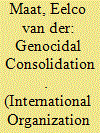

|
|
|
|
|
| Summary/Abstract |
Under conditions of guerrilla conflict, mass indiscriminate violence has been shown to effectively starve a guerrilla of its support. Consequently, counter-guerrilla mass violence is concentrated within territories where a guerrilla is dominant. However, in roughly 40 percent of mass violence episodes (e.g., Rwanda and Cambodia), the violence was aimed at populations within areas of secure territorial control. These episodes have therefore been explained by attributing ideological preferences to leaders or as unique cases only. I argue that leaders adopt mass indiscriminate violence against outgroups to consolidate power under conditions of elite rivalry. The violence serves two main goals. First, it helps build coalitions with constituencies that gain from violence; and second, it targets rival factions indirectly by forcing local security officials to facilitate or oppose the violence. The violence thereby provides rival supporters with an exit option, provides the regime with information on rival supporters’ private loyalties, and undermines rivals’ abilities to mount an effective resistance. These rivals can ultimately be purged from the regime. Based on newly collected original data on elite purges and on the type of mass indiscriminate violence for the years 1950 to 2004, I show that this type of mass violence, which I call “genocidal consolidation,” is intimately connected to authoritarian consolidation.
|
|
|
|
|
|
|
|
|
|
|
|
|
|
|
|
| 10 |
ID:
192870
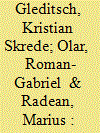

|
|
|
|
|
| Summary/Abstract |
We examine how popular dissent affects the likelihood that political leaders lose power, distinguishing between types of dissent in terms of nonviolent/violent primary tactics as well as the level of individual participation. We posit that protests threaten leaders both directly through the governance costs of citizen non-compliance, and indirectly through the increased risk of elite defections in the ruling coalition. In a series of propositions we detail how the type of dissent and the magnitude of participation influence the odds of leaders surviving in office. We argue that mass nonviolent challenges tend to be more threatening to a leader’s rule than violent dissent, given the characteristics of movements likely to choose nonviolent tactics. Moreover, the effectiveness of the challenge increases in the scale and size of the dissident campaign, and movements that can mobilize larger numbers have a comparative advantage in nonviolent tactics. Employing data on political leaders’ tenure and dissident campaign characteristics, we provide evidence consistent with our expectations.
|
|
|
|
|
|
|
|
|
|
|
|
|
|
|
|
| 11 |
ID:
097046
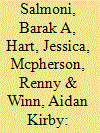

|
|
|
| 12 |
ID:
095689
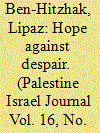

|
|
|
| 13 |
ID:
182662
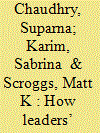

|
|
|
|
|
| Summary/Abstract |
The use of forced recruitment strategies during war can adversely affect military effectiveness and human rights. Given these costs, under what conditions do state leaders adopt coercive recruitment during civil wars? We find that between 1980 and 2009, states changed their recruitment practices 140 times during civil wars – half of which were towards coercive recruitment. Since structuralist explanations focus on factors that remain more or less constant over time, they cannot explain the frequency of these changes. Instead, we focus on individual-level factors and argue that leaders’ dispositions as risk-takers determine their beliefs about using force to solve collective action dilemmas during civil wars. Further, conflict context matters for leaders’ recruitment decisions – when rebel groups engage in coercive recruitment, leaders may also feel more justified in using such strategies. Using the LEAD Dataset and data on recruitment, we find that risk-tolerant leaders, including those who have had careers in the security sector, as well as those who have prior experience as a rebel or revolutionary leader, are more likely to use force to increase recruitment. While we theorize that this effect may be mitigated by combat experience, the evidence is mixed. Lastly, we find that rebels’ use of forced recruitment makes state leaders less likely to use voluntary recruitment.
|
|
|
|
|
|
|
|
|
|
|
|
|
|
|
|
| 14 |
ID:
095685
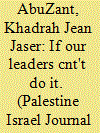

|
|
|
| 15 |
ID:
117016


|
|
|
|
|
| Publication |
2012.
|
| Summary/Abstract |
Leadership turnover may produce significant foreign policy changes when leaders differ from their predecessors in their preferences over the resort to war and when they cannot commit to implement inherited policies. How, then, does the expected behavior of an incumbent leader's successor affect crisis bargaining in the present? I analyze a leader-centric model of crisis bargaining in which (a) the distributive outcomes of crises affect political survival, (b) leadership turnover implies the accession of a new leader with potentially different preferences, and (c) successors can renegotiate inherited settlements. In equilibrium, the sensitivity of an incumbent's political survival to making concessions interacts with the resolve of the successor to affect both the terms of settlement and the occurrence of war. First, political survival incentives can lead an incumbent to demand more than her adversary is willing to concede, provoking war when the successor is of similar resolve. Second, when a politically sensitive incumbent will be followed by a resolute successor, her adversary may grant otherwise unnecessary concessions to bolster the relatively irresolute incumbent in office. Finally, when a politically sensitive incumbent will be followed by an irresolute successor, her adversary may attack in order to depose the incumbent, hastening her replacement to secure better bargains in the future. Predictions about the present balance of resolve and leaders' survival incentives may thus be fundamentally altered in light of the future balance of resolve.
|
|
|
|
|
|
|
|
|
|
|
|
|
|
|
|
| 16 |
ID:
107643
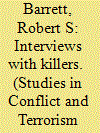

|
|
|
|
|
| Publication |
2011.
|
| Summary/Abstract |
Interviews conducted with leaders, combatants, witnesses, and victims in central Nigeria provide insight into the processes of volunteerism, recruitment, and indoctrination within armed groups. Identified are numerous avenues by which previously nonviolent citizens become willing perpetrators in deadly grass-roots conflict. Despite a commonly advertised motive for joining, narrative analyses reveal several diverse and underlying motivations. Six distinct combatant typologies are described: the Follower, the Pragmatist, the Criminal, the Soldier, the Basic Needs, and the Ideologue. The characteristics of each type, the timing of their entry into the conflict, and the implication for select intervention strategies are discussed.
|
|
|
|
|
|
|
|
|
|
|
|
|
|
|
|
| 17 |
ID:
066285
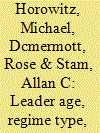

|
|
|
| 18 |
ID:
088073
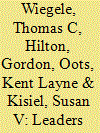

|
|
|
|
|
| Publication |
Durham, Duke Press Policy Studies, 1985.
|
| Description |
xvi, 226p.
|
| Standard Number |
0822306417
|
|
|
|
|
|
|
|
|
|
|
|
Copies: C:1/I:0,R:0,Q:0
Circulation
| Accession# | Call# | Current Location | Status | Policy | Location |
| 029920 | 353.03230922/WIE 029920 | Main | On Shelf | General | |
|
|
|
|
| 19 |
ID:
100981
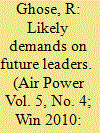

|
|
|
| 20 |
ID:
139560
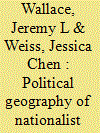

|
|
|
|
|
| Summary/Abstract |
Why do some Chinese cities take part in waves of nationalist protest but not others? Nationalist protest remains an important but understudied topic within the study of contentious politics in China, particularly at the subnational level. Relative to other protests, nationalist mobilization is more clustered in time and geographically widespread, uniting citizens in different cities against a common target. Although the literature has debated the degree of state-led and grassroots influence on Chinese nationalism, we argue that it is important to consider both the propensity of citizens to mobilize and local government fears of instability. Analysing an original dataset of 377 anti-Japanese protests across 208 of 287 Chinese prefectural cities, we find that both state-led patriotism and the availability of collective action resources were positively associated with nationalist protest, particularly “biographically available” populations of students and migrants. In addition, the government's role was not monolithically facilitative. Fears of social unrest shaped the local political opportunity structure, with anti-Japanese protests less likely in cities with larger populations of unemployed college graduates and ethnic minorities and more likely in cities with established leaders.
|
|
|
|
|
|
|
|
|
|
|
|
|
|
|
|
|
|
|
|
|